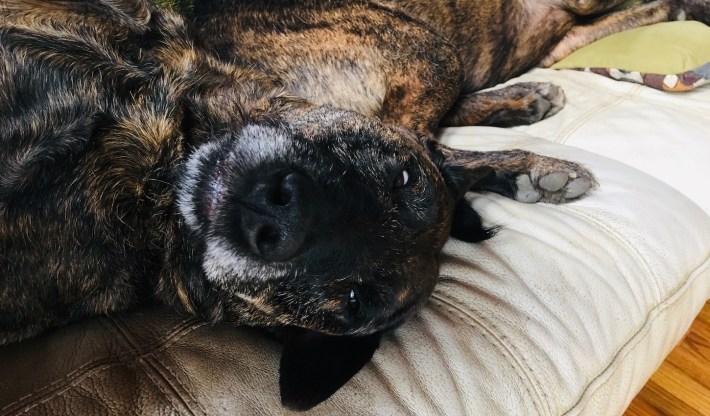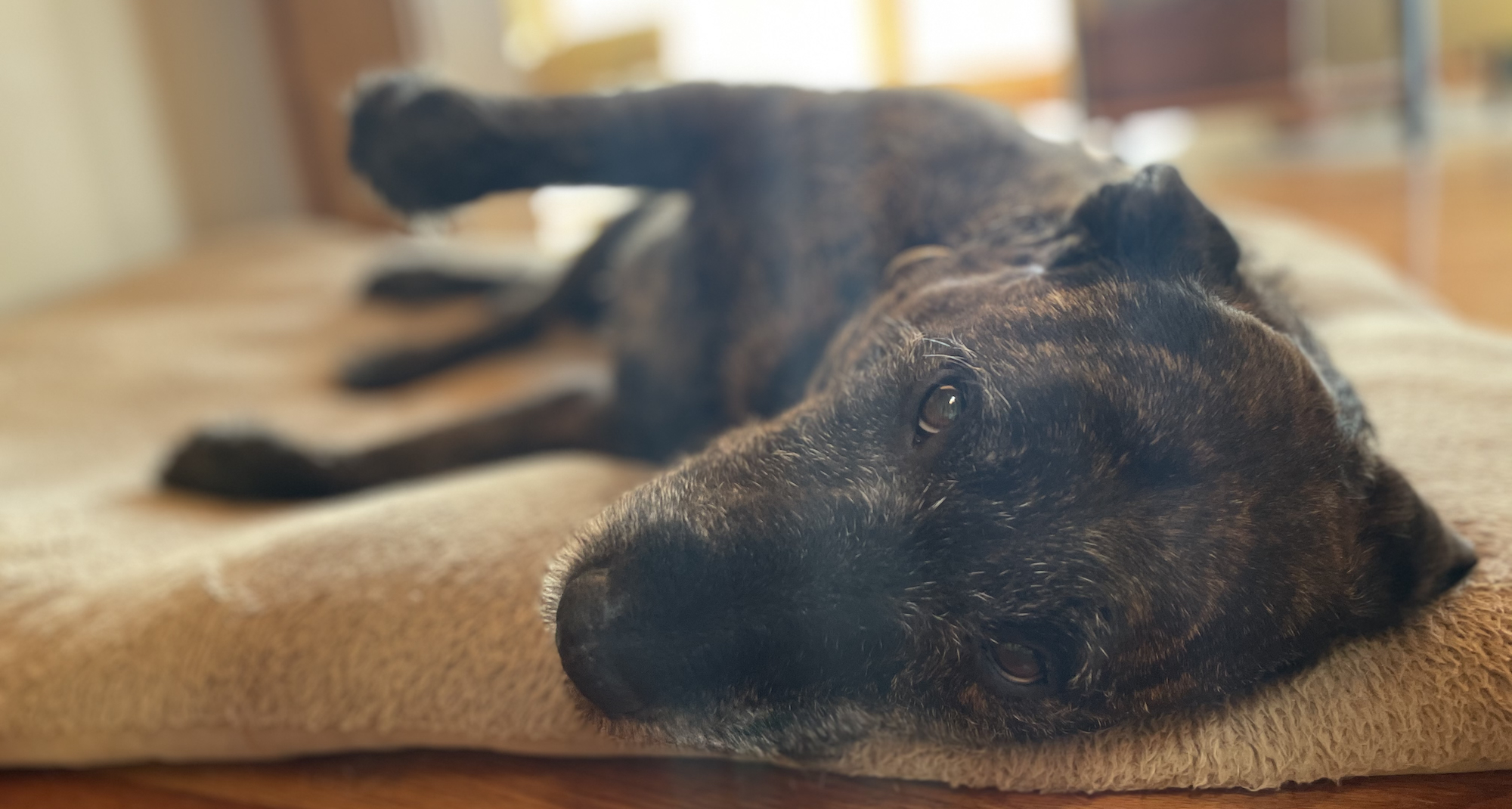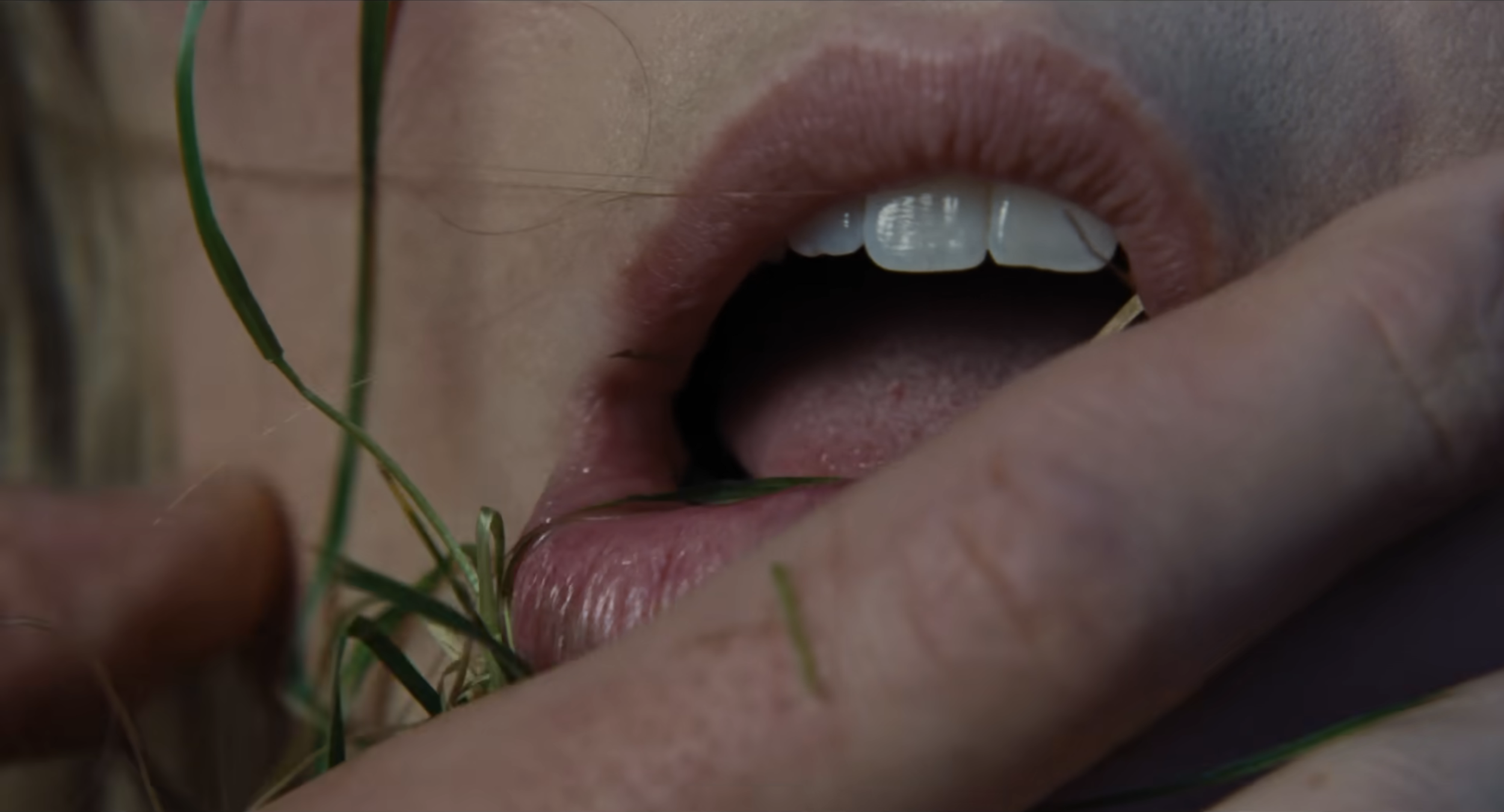I was still reeling in the aftermath of our dog Chop's sudden and horrible heart-failure death, stunned and breathless with grief, feeling very much the way you do after taking a hard blow to the head, when all at once our Bea became a ghost of herself. She was old, and had been thinning in the way old dogs do in their final year, but still in all outward respects her loud, wiseass, insistent self, buzzing with impatience, shepherding my wife to bed at The Appointed Time, shoveling her snout under your hand and levering it onto her neck when she wanted pets: Bea.
Then, on a Saturday evening in early April, she all at once flipped out at our other dog, Grover, when he came up behind her: snarling and snapping, fighting as though for her life. We had to pull them apart. In the immediate aftermath, she was the most alarmingly depleted dog I have ever seen. She could scarcely stand. It was as though a band had snapped in there. It was as though she had spent the absolute last of herself.
The kind veterinarian who came to the house told us, gently, that dogs are great at hiding things like pain and suffering. They can hide 99 percent of it for a long, long time—but then, at a certain point, they cross a threshold, and can't hide even the littlest bit of it anymore. The implication was unbearable. Bea wasn't suddenly sick. We were seeing, suddenly, how sick Bea had been for probably months. Her liver was swollen to extraordinary size; it was disrupting circulation to her hindquarters; it was also functioning too poorly to make any use of whatever medication we'd give her.
I couldn't help, then, thinking of the day we first met Bea—pronounced bee—and her departed sister Dot. The dog-rescue couple pulled up to our house and came inside with these tiny, scruffy, wormy, glassy-eyed messes, practically feral—Bea (her name was Jessie then) peed in my hand when I picked her up—yet also devastatingly pretty, with their almond-shaped eyes and coy glances, their Muppet fur and cartoonish curled tails. To say that we wanted them, or agreed to adopt them, feels ridiculous; the simple fact of the matter is, having met them, we could not possibly accept sending them back to whatever coal chute or missile-testing site they'd come from.
(Of course I say that now, but the truth of the matter is that not six months had passed before, in anguish and despair, we concluded we could not possibly care adequately for these deranged, wild, coyote-ass dogs, yowling and shitting and escaping at all times while we tried to also care adequately for our young children, who also yowled and shat and toddled off a lot. We found a lovely family who took Bea and Dot from us ... and returned them, later that same day, practically screeching their tires on the way out. This became part of their Lore, and our knee-buckling relief at getting them back is how we knew we were supposed to keep them forever.)
The rescue lady offered to microchip them for us, back on that first day, and pulled out a needle the size of a coffee stirrer. When she poked this absolute Slurpee straw through their respective hides—baggy between their shoulder-blades, they were such scraggly little ragamuffins—you could hear the puncture from across the room. Neither of them so much as flinched. I have never seen anything like it.
It made me cry, then. I took it as an index of the hardship they were used to, born stray, death-row residents at a pound before they were two months old, then sharing a single room in what could only be a squalid in-home rescue with more than a dozen other dogs. What's one more wound? And it was that, sure, but it was also a testament to how tough they were, how resourceful, how sufficient to each other. And to how much pain they could bear. That is very hard to think about now.
When Dottie died back in 2021, I wrote that she was the smartest dog I ever met, where a dog's smarts are measured by her facility for fitting in among a whole other species, figuring out its norms and how to be responsible amid them. By those measures Bea was ... well, not as smart. By those measures Bea was in fact what the dog-trainer called "a basketcase," too high-strung and stressed out to take much confidence or reassurance from successfully following obedience commands, or being praised, or getting treats, or smoothly adapting to the flows and currents of a pack, or a household, or a day.
But she was also, by other measures, unmistakably whip-smart: a crafty and proficient reader, shepherd, and trainer of humans; an ace problem solver; a brilliant if never remotely mellifluous communicator; an unerring discerner and utilizer of patterns. Interacting with her was often very like interacting with a very precocious, very under-stimulated child, who has figured out the letter of every household law and also that she respects the spirit of none of them. She would race to obey a command she saw coming before you even issued it; she'd have discarded it by the time it was out of your mouth.
An example: "Place" is a command that tells a dog to go to, well, a given place—a dog bed, typically, but it could just as easily be a rug or a spot on the couch or whatever—and remain there, with at least two paws on the place, until vocally released. It's useful for when a guest is coming over who might not want a dog all over them; or when you're eating food and want to give your dog some task to compete with their impulse to sniff around and beg for a bite; or when you have multiple dogs and you want to give them chew toys and don't want them hassling each other; or even when your dog is bored and just needs a Duty to fulfill. It's even tiring for them, believe it or not, when they have to resist a lot of distractions and temptations for the sake of remaining on place.
Bea knew this command at least as well as any of our dogs. She also knew when it was coming: She'd picked up on patterns of movement and body language that preceded it, and situations that routinely occasioned it. She'd also figured out the limits of our attention, and that we only ever had so much willpower to withstand this Paul Rudd routine—
—when she decided it was time to release herself. That video is a shockingly accurate depiction of what these interactions could be like. Enough so that it hurts to watch.
I fear that I am making Bea sound like a huge pain in the ass. She certainly could be! No fair remembrance could ignore her excellence in the field of driving me insane. But any strong-willed family member or harmless rapscallion can be a gigantic pain in the ass. There was much more to Bea than this.
She was so quaint, so surprisingly old-fashioned in her ladylike-ness: how she unfailingly crossed her legs when reclining; how she laid next to her bowl at mealtimes and chewed and swallowed her food one single kibble at a time; the light tap-tap-tap of her incongruously dainty trot. And then what an absolute dingo she was the rest of the time: how she'd sprawl onto her back on the living-room rug and squiggle around, growling and grumbling her way through a self-administered back-scratching; the sly look she'd give you when you caught her making her way up the driveway, back to the house, having leapt the fence and disappeared into the woods without anybody noticing; how she'd plop herself in a corner of the couch and spend half an hour gnawing her own toenails, but would threaten grisly death if you approached her with the clippers. The 20 textures and 300 colors of her wild, wiry coat, and her frank insistence that you scratch it.

She also adored my wife with a headlong fullness and totality that made Romeo Montague look like an Easter Island statue. This love was almost painful to witness, in its simple perfection. So much of the day-to-day Bea Experience concerned what she did not want or like: She did not want to stay on place, or inside the fence; she did not want to wait for dinner, or to wait quietly while you finished yours; she did not like for Grover to walk past her when she was sprawled across the main thoroughfare of the house; she did not want you to stop petting her. What she did want and like, the lodestar of her existence, was for the two of them to be together.
She pursued this relentlessly and policed it militantly. At 9 p.m. sharp she would gather my wife for their bedtime routine; if my wife wasn't ready just yet, Bea would return at 9:30 sharp, practically tapping her watch. When my wife would work in the small office-y room behind the kitchen, Bea would stretch herself along the baseboard just outside the door—a spot in the house where you would never find her for even a moment under any other circumstances—and remain there until it opened. When my wife meditated in our bedroom, Bea would sit prim and (relatively) quiet beside her. I hope I can say without being too much of a Wife Guy that in this Bea was both smart and wise. Let me know with half Bea's clarity exactly where in the world I want to be; give me half her zeal to hold onto what I love, for as long as I can, with all of me. Amen.






